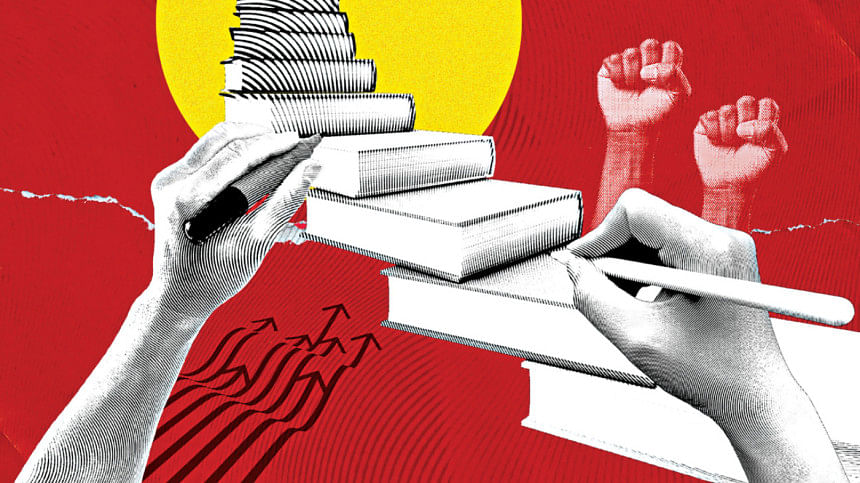Appointment by allegiance

Let us begin with the findings of a Daily Star investigation of December 2024.
It found that 30 of the 47 newly appointed vice-chancellors, and 18 of 40 pro-VCs and treasurers, had close ties to teachers' groups linked or affiliated with BNP or Jamaat-e-Islami.
The report had case studies too and cited several instances.
Prof ABM Obaidul Islam of Dhaka University, a former convener of a BNP-backed teachers' panel, was appointed vice-chancellor of Bangladesh Open University.
His successor, Prof Lutfor Rahman, took over as pro-VC of National University.
Jahangirnagar University saw both VC and pro-VC posts go to leaders of the pro-BNP Jatiyatabadi Shikkhak Forum.
At Bangladesh Agricultural University and Khulna University, partisan appointees followed a similar pattern.
For years, appointments to top posts in Bangladesh's public universities have lacked transparency, fairness, and procedural legitimacy.
Search committees are seldom formed in advance.
Public calls for nominations are virtually nonexistent while decisions are made behind closed doors removed from scrutiny.
Merit is rarely the deciding factor. Personal referrals, political vetting, and partisan bargaining too often determine who leads our campuses.
The key roles of vice-chancellors, pro-VCs, registrars, treasurers frequently go to those with the right networks, not the strongest credentials.
This isn't a new trend or a novel observation. It's a flawed practice that spans governments and erodes institutional integrity across the board.
The result has been a disillusioned faculty, deteriorating teaching and research standards, and an exodus of talent seeking systems where success follows merit, not allegiance.
However, within academic circles, the dominance of political allegiance in university appointments has been an open secret, implicitly acknowledged even.
But it is rarely confronted meaningfully except as passing mentions during fiery speeches.
It could not have been more apparent than when a senior policymaker, in a rare moment of candour, publicly confirmed what many had fleeting suspicions about.
At a policy dialogue on June 21, Planning Adviser Wahiduddin Mahmud, who oversaw education during the first seven months of the interim government, shared a revealing account of how political considerations continued to shape university appointments.
He said he had inherited a system stuck in limbo.
Key posts were vacant, and there was no fair process to fill them.
Without a political party to lean on, and faced with urgent problems, he turned to personal networks and recommendations.
He even reached out to BNP Secretary General Mirza Fakhrul Islam Alamgir, his longtime friend; for names of "honest" candidates.
He said his goal was to avoid simply replicating the habit of installing Awami League loyalists.
But the subsequent appointments can't quite be termed impartial either.
One filter was swapped for another. Awami League-affiliated academics were kept out, and candidates with "mild" or "inactive" BNP ties were actively preferred.
The erstwhile education adviser justified this as pragmatic, arguing that in a system where most senior academics have some political history, true neutrality is nearly impossible.
The outcome could not have been more predictable.
Political reliability remained the primary gateway to leadership. Academic merit was considered if one after one passed the political litmus test.
In practice, this meant many qualified academics with the "wrong" affiliations were excluded before their credentials were even considered. While "merit" remained the official buzzword, the process was hollow at its core.
The message couldn't be clearer that in Bangladesh's higher education, political alignment trumps scholarly achievement.
And politics isn't the only problem. Personal ties matter too.
A relative of the education adviser who was herself a syndicate member at Netrokona University (formerly Sheikh Hasina University), reportedly pushed four candidates for the top role at Jahangirnagar University.
None were picked there, but two landed top posts at the Netrokona University.
Nepotism and favouritism keep winning.
As should be evident from the pattern, this doesn't stop at the top.
Vice-chancellors chosen through political filters often use the same filters in faculty and staff appointments.
They reward loyalists, silence dissent, and solidify patronage networks.
We've seen this play out before. And it's playing out again.
A formal search committee was finally constituted by May 2025.
But by then, the major appointments had already been settled.
Calls for a codified, transparent appointment framework had long been ignored.
Although, one hopes that the search committee, at most an eye wash this time, will set a precedence.
But it should become increasingly apparent that the interim government lost out on a potential opportunity to revitalise our universities with dynamic leadership.
The interim government that was born of a public uprising could have chosen to turn our university campuses into beacons of knowledge and research.
Instead, they have installed administrations that will only seek to placate the establishment and pander to the rulers.
Arafat Rahaman covers education and public policy for The Daily Star. Reach him at [email protected] to share thoughts or leads

 For all latest news, follow The Daily Star's Google News channel.
For all latest news, follow The Daily Star's Google News channel. 



Comments